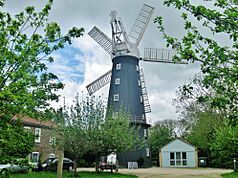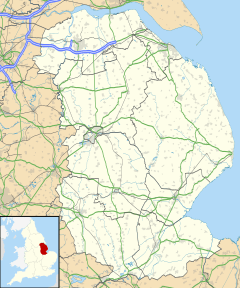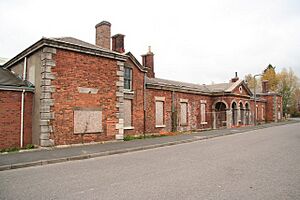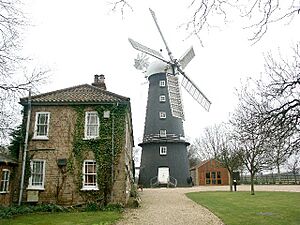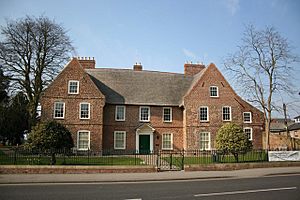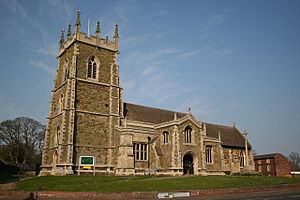Alford, Lincolnshire facts for kids
Quick facts for kids Alford |
|
|---|---|
| Town and civil parish | |
|
Clockwise from top:Alford Windmill, St Wilfrid's Church, Old railway station, South Street and Market Place |
|
| Population | 3,830 (2021) |
| OS grid reference | TF454758 |
| • London | 120 mi (190 km) SSW |
| Civil parish |
|
| District | |
| Shire county | |
| Region | |
| Country | England |
| Sovereign state | United Kingdom |
| Post town | ALFORD |
| Postcode district | LN13 |
| Dialling code | 01507 |
| Police | Lincolnshire |
| Fire | Lincolnshire |
| Ambulance | East Midlands |
| EU Parliament | East Midlands |
| UK Parliament |
|
Alford (pronounced OL-furd) is a small market town in Lincolnshire, England. It is located at the edge of the Lincolnshire Wolds, a beautiful area known for its natural scenery. In 2021, about 3,830 people lived here. Alford is found between the towns of Mablethorpe, Louth, Spilsby, and Skegness. It serves as a local shopping hub for the surrounding area.
Contents
A Look at Alford's Past
Alford has a long history, dating back to before the Normans arrived in England. Its name, "Alforde," was first written down in the Domesday Book. The "ford" part of its name suggests it was a place where people could cross a small river or stream.
How Alford Became a Market Town
In 1283, Alford became an important market town. William Well, who was the lord of the manor, received special permission for the town to hold a market every Tuesday. Two big fairs were also held each year, one in spring and one in November. These markets and fairs were very active until 1939. A special market for cattle started in 1911 but closed in 1987.
The Railway Comes to Town
A railway line opened in Alford in 1848. This made it easier for people and goods to travel to and from the town. However, the railway closed in 1970, and the tracks were removed.
How Alford is Governed
Alford has its own electoral ward, which is an area used for local elections. This ward extends from the town all the way to the coast. In 2011, about 4,531 people lived in this larger area.
What You Can Find in Alford
Alford has many shops and services that meet the needs of its residents.
Shops and Services
You can find a pharmacy, a grocery store, and two butchers in town. There are also stores for DIY (Do It Yourself) projects and hardware. Three supermarkets are located on Church Street, West Street, and Hamilton Road.
Places to Eat and Stay
Alford has several pubs, which are traditional English places to eat and drink. These include the Half Moon Hotel, Windmill Hotel, George, Anchor, and White Hart. Some of these also offer places to stay, like the Windmill and Anchor, which is now a bed-and-breakfast.
Banking and Post Office
While the last bank in Alford closed in 2018, you can still find banking services at the Post Office. The Post Office is located inside the Quicky Supermarket on West Street. There is also a Yorkshire Building Society office.
Arts and Crafts
Alford is known for its pottery and craft scene. Alford Pottery, which started in London in 1972, moved to Alford in 1973. They make tableware that is sold all over the world. The pottery also helped start the Alford Craft Market. This market is a cooperative where local artists sell their handmade items. The Craft Market Centre also offers classes and workshops for people to try out different arts and crafts.
Health Services
The town has private dentists on South Street and a doctor's surgery on West Street. A crematorium (a place where bodies are cremated) opened near the town in 2008.
Local Markets and Events
Tuesday is the main market day in Alford. The town council runs a market in the marketplace, selling groceries, fish, and other goods. There's even a popular auction. The Alford Craft Market is a special event held several times a year, including in late spring and August. A summer weekly Craft Market now takes place in the Corn Exchange. In December, the Christmas Extravaganza is held at the Manor House.
Schools in Alford
Alford has three schools for young people.
- One primary school for younger children.
- Two secondary schools:
- Queen Elizabeth's Grammar School, founded in 1566.
- John Spendluffe Technology College.
Both secondary schools have received "Good" ratings in recent inspections.
Jobs and Getting Around
Many factories in Alford have closed in recent years. Today, the main jobs are found in newer businesses on the Safelincs industrial estate. Schools, nursing homes, and smaller companies also provide many jobs.
The Beeching's Way Industrial Estate is located where the old railway lines used to be. It has printing and manufacturing companies, a builders' merchant, and a postal sorting office. The name "Beeching's Way" reminds people of Richard Beeching. He was responsible for closing many railway lines across the UK in the 1960s.
The town's largest employer used to be C. S. Martin, which later became Finnveden Powertrain Ltd. This factory closed in 2010. After some changes, it now operates as Gnutti Carlo UK Ltd.
Bus Services
Alford has bus services that can take you to nearby towns.
- There's a bus service to Skegness from Monday to Friday during the day.
- A single bus service goes to Boston on Wednesdays.
- There are also local and school bus services available.
- You can also catch buses to Mablethorpe and Spilsby, and one service a day to and from Louth.
The closest train station is in Thorpe Culvert.
Population Changes
| Historical population | |||||||||||||||||||||||||||||||||||||
|---|---|---|---|---|---|---|---|---|---|---|---|---|---|---|---|---|---|---|---|---|---|---|---|---|---|---|---|---|---|---|---|---|---|---|---|---|---|
|
|
||||||||||||||||||||||||||||||||||||
In 2011, Alford's population was 3,459 people. By 2019, it was estimated to be around 3,789. The larger Alford electoral ward had a population of 4,531 in 2011.
Famous Places in Alford
Alford has some interesting landmarks that are worth visiting.
The Windmill
Alford is famous for its five-sailed windmill. It was built in 1837 and is a Grade I listed building, meaning it's very important historically. In the past, it could grind 4-5 tons of corn every day! It stopped working in 1955 but was fixed up in 1957. Today, it still makes stone-ground organic flour and cereal. It's the only windmill left in Alford that still works.
The Manor House
Alford Manor House is one of the biggest thatched buildings of its kind in the country. In 2006, it was renovated with money from the National Lottery. It now has interactive exhibits and is easier for disabled visitors to access. You can also enjoy a tearoom and beautiful gardens.
The Manor House has two permanent exhibitions. "Alford Remembers" shows items from the First World War. There's also a photography exhibition by Edwin Nainby, who was a photographer in Alford in the late 1800s. He took over 750 glass plate photographs! The Manor House also hosts annual events like a Christmas Tree exhibition and a tractor rally. At the back, Hackett's Barn is a local museum showing what Alford was like as a Victorian market town.
The Corn Exchange
The Corn Exchange is a building that was given to a group of volunteers. They use it as a center for cultural, social, and community activities in Alford.
Media and News
If you're in Alford, you can get local news and TV shows from BBC Yorkshire and Lincolnshire and ITV Yorkshire. TV signals come from the Belmont TV transmitter.
For radio, you can listen to BBC Radio Lincolnshire, Greatest Hits Radio Lincolnshire, and Hits Radio Lincolnshire.
The local newspaper that serves the town is called LincolnshireWorld.
Churches and Religious Places
The main Anglican church in Alford is St Wilfrid's Church. It was built in the 14th century and has been restored over the years. Inside, you can see old features like a 14th-century screen and a 17th-century tomb. The church also has a war memorial to remember local people who died in wars.
Alford also has a Methodist church, an Independent Congregational church, and the Alford Christian Fellowship.
Famous People from Alford
Many notable people have connections to Alford:
- Captain John Smith (1580–1631) was a famous explorer who helped explore New England. He is known for being saved by the Native American "princess" Pocahontas. He went to school in Alford.
- Anne Hutchinson (1591–1643) was an important Puritan settler and religious reformer in New England.
- Edward Hutchinson (1613–1675), Anne Hutchinson's son, was born in Alford. He became a soldier and politician in America.
- William Wentworth (1616–1697), also born in Alford, was an early settler in New Hampshire.
- Susanna Cole (1633 – c. 1713), born in Alford, was captured by American Indians as a child and raised by them.
- William Charles Ellis (1780–1839), born in Alford, was a pioneer in treating mental illness kindly.
- Elizabeth Dawbarn (died 1839), born in Alford, was a Baptist writer who published religious pamphlets.
- George Manville Fenn (1831–1909), a novelist, used to teach in Alford.
- Enid Stamp-Taylor (1904–1946), a film actress, is buried in Alford's churchyard.
- Tony Richardson (1943–2007), a footballer born in Alford, played for teams like Nottingham Forest.
 |
Saleby, Strubby, Saltfleetby |  |
||
| Haugh, Calceby, Lincoln | Bilsby, Huttoft, Anderby | |||
| Willoughby, Welton le Marsh, Spilsby |
Arms
|
See also
 In Spanish: Alford (Lincolnshire) para niños
In Spanish: Alford (Lincolnshire) para niños
 | Audre Lorde |
 | John Berry Meachum |
 | Ferdinand Lee Barnett |


